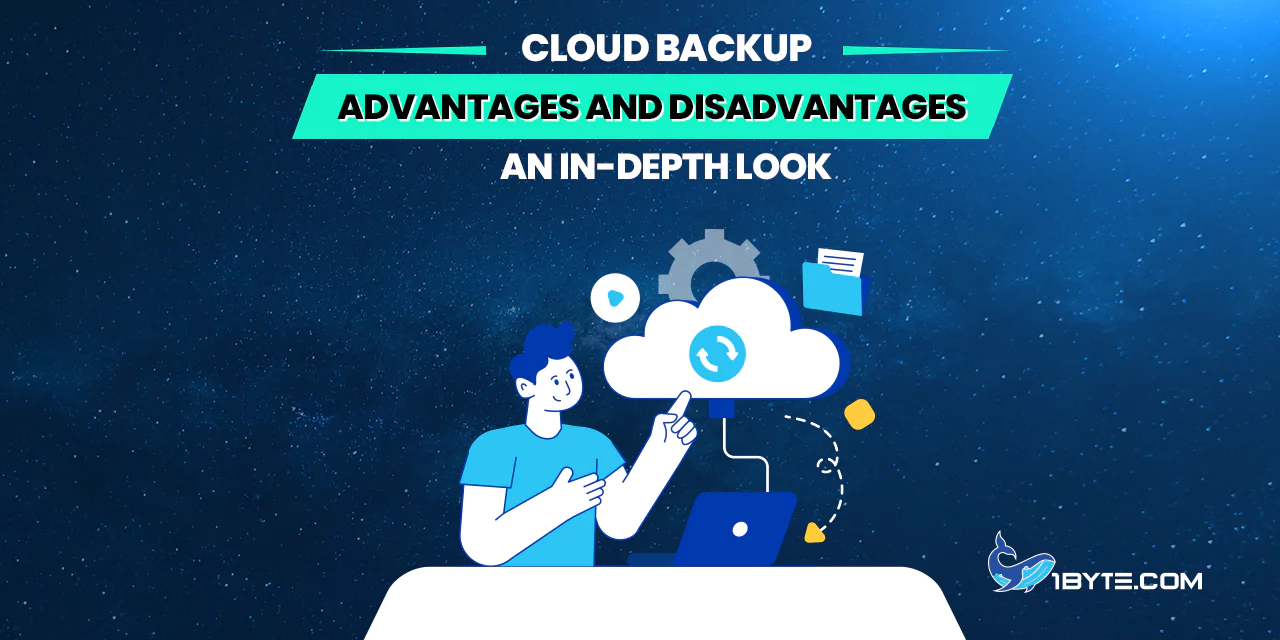As we traverse the digital terrain, we come across a vital element – data storage. Here, cloud backup emerges as a significant contender. This article offers a detailed examination of the “cloud backup advantages and disadvantages”.
Data holds immense value. It forms the backbone for both businesses and individuals. Therefore, its secure storage and protection are of utmost importance. Cloud backup presents a solution, albeit with its own set of pros and cons.
We set out on an expedition to scrutinize these facets. Our guide will dissect the merits and demerits of cloud backup. The phrase “cloud backup advantages and disadvantages” encapsulates the crux of our discourse.
Our objective? To demystify the intricacies of cloud backup. We aim to equip you with the knowledge to make informed decisions about your data storage requirements. So, let’s plunge into the realm of cloud backup together.
Bear in mind, every technology has its strengths and weaknesses. Cloud backup is no different. By comprehending these, we can maximize its potential and minimize the risks. Stay connected as we delve deeper into the captivating world of cloud backup.
Understanding Cloud Backup
As we delve deeper into our topic, we turn our attention to cloud backup. This technology holds a significant place in the world of data storage. But what is it exactly? And why is it important? These are the questions we aim to answer as we explore the “cloud backup advantages and disadvantages”.

Cloud backup is not just a trendy term. It’s a potent tool that can protect our valuable data. However, like any tool, it has its own set of unique features and complexities.
In this section, our goal is to simplify cloud backup. We’ll explain it in terms that are easy to understand. Our aim is to give you a thorough and clear understanding of cloud backup. So, let’s start this enlightening journey together.
Explanation of what cloud backup is
We’re diving deep into our main subject – cloud backup. This term signifies the act of duplicating and preserving data on a distant, cloud-based server. It’s a strategy that guarantees the safety and accessibility of data.
Cloud backup works on a straightforward principle. It takes your data, creates a duplicate, and secures it on a cloud server. This server could be situated anywhere globally, yet your data is merely a few clicks away.
The charm of cloud backup is in its simplicity and effectiveness. It removes the need for physical storage devices, making data backup a smooth operation. Furthermore, it provides scalability. Whether you possess a handful of crucial files or terabytes of data, cloud backup can accommodate it all.
However, the conversation on “cloud backup advantages and disadvantages” discloses that it’s not all positive. Like any technology, cloud backup has its own set of hurdles. But before we dive into those, it’s crucial to comprehend what cloud backup is and why it’s a revolutionary change in data storage.
Importance of cloud backup in data storage and protection
Cloud backup, a method involving the transmission of data duplicates across a network to an off-site server, stands as a cornerstone of data storage and protection. It acts as a shield, fortifying valuable digital assets against the dire consequences of data loss.
Let’s delve into the particulars. Cloud backup functions akin to traditional physical data storage, where enterprises harbor data in remote facilities. However, physical storage encounters constraints such as logistical challenges and the specter of hardware malfunction. Cloud backup surmounts these hurdles, presenting users with the convenience to store, oversee, and recuperate their data via an online interface.
The significance of cloud backup is underscored by the proliferation of cyber threats. In this epoch of technological advancement, the battle against cyber-attacks rages incessantly. Even sophisticated antivirus solutions cannot offer foolproof protection. Should a pernicious virus or intricate malware breach the defenses and corrupt the data, cloud backup emerges as the ultimate safeguard, furnishing a pristine foundation from which the system can be reinstated.
Statistics delineate a stark portrait of the indispensability of cloud backup. A recent survey divulged that 79% of companies have weathered at least one cloud data breach, with 43% reporting 10 or more breaches in recent times. Despite this alarming trend, only 24% of organizations boast a well-documented, rigorously tested, and routinely updated disaster recovery plan.
Cloud backup transcends mere data protection; it embodies the essence of business continuity. In the wake of a calamity, whether natural or man-made, the secure storage and backup of data in the cloud can serve as a linchpin for ensuring uninterrupted business operations.
Advantages of Cloud Backup
Now that we’ve grasped the concept of cloud backup, let’s delve into its benefits. In this section, titled ‘Advantages of Cloud Backup,’ we’ll highlight the positive aspects. We’ll discuss each advantage in detail, offering a comprehensive understanding of why cloud backup is increasingly popular for data storage and protection.
Our focus will be on the advantages of cloud backup, keeping our sentences short and simple for easy comprehension. So, let’s explore the numerous benefits that cloud backup offers.
The benefits of using cloud backup
To begin with, it’s an effective way to protect data. By storing your data in a remote location, cloud backup ensures your data remains secure and accessible, even if a disaster impacts your primary data location.
Next, it’s a cost-efficient solution. Unlike traditional backup methods that require significant investment in hardware, software, and maintenance, cloud backup operates on a pay-as-you-use model, reducing initial costs.
Moreover, it’s scalable. As your business expands, so does your data. Cloud backup enables you to effortlessly increase your storage capacity to match your needs.

Furthermore, it guarantees easy data recovery. In the event of data loss, you can swiftly retrieve your data from the cloud, minimizing downtime and maintaining business operations.
Finally, cloud backup offers automated backup solutions. You can set up regular backups, ensuring your data is consistently current.
In summary, while there are challenges to consider with cloud backup, the advantages are evident. It’s an efficient, cost-effective, scalable, and secure method for data protection that’s suitable for businesses of all sizes. With a well-thought-out cloud backup strategy, potential disadvantages can be transformed into advantages. Remember, the key is in the planning.
Real-world examples or case studies
Let’s examine some real-world scenarios that illustrate the advantages and disadvantages of cloud backup.
Example 1: Small Business
Consider a small business that recently transitioned to cloud backup. They found it to be cost-effective, eliminating the need for expensive hardware. The pay-as-you-go model aligned perfectly with their budget. However, they encountered issues with internet connectivity, occasionally slowing down the backup process.
Example 2: Large Corporation
A large corporation also benefited from cloud backup. Dealing with vast amounts of data daily, they appreciated the scalability it offered. They could effortlessly expand storage capacity as required. Nevertheless, they had to invest in robust security measures to safeguard sensitive data.
Example 3: E-commerce Platform
An e-commerce platform faced a server failure resulting in significant data loss. Thanks to their cloud backup solution, they swiftly restored the lost data, minimizing disruption to business operations. This underscores the importance of seamless data recovery, a notable advantage of cloud backup.
Example 4: Educational Institution
An educational institution automated their backup process using cloud backup, ensuring data remained current without manual intervention. However, they had to navigate the learning curve associated with adopting new technology.
In conclusion, these examples offer a comprehensive perspective on the advantages and disadvantages of cloud backup. They demonstrate how cloud backup can serve as an efficient, cost-effective, scalable, and secure solution for data protection. Nonetheless, challenges such as internet reliance, security considerations, and the need for technical proficiency should be acknowledged. A well-devised cloud backup strategy can mitigate these challenges and leverage them to enhance data management practices.
Disadvantages of Cloud Backup
While cloud backup offers numerous benefits, it’s crucial to weigh the downsides. In this segment of our detailed examination of ‘Cloud Backup Advantages and Disadvantages,’ we’ll illuminate the potential drawbacks. Our goal is to provide a balanced perspective, aiding you in making informed decisions. It’s important to remember that every technology has its strengths and weaknesses, and cloud backup is no different. So, let’s explore the specifics.
The drawbacks of using cloud backup
Exploring the realm of cloud backup reveals a multitude of advantages, yet it’s equally vital to grasp its potential drawbacks. Achieving a balanced understanding becomes paramount when delving into the realm of “cloud backup advantages and disadvantages.”
Dependence on Internet Connectivity: Cloud backup heavily leans on the reliability of internet connectivity. In the absence of a steadfast and high-speed connection, the process of backup and recovery may sluggishly trudge along, rendering it inefficient.
Concerns Regarding Security: Entrusting sensitive data to the cloud can open avenues to security vulnerabilities. Despite the deployment of sophisticated encryption techniques, the specter of data breaches and unauthorized access looms ever-present.
Long-Term Costs: Although cloud backup may initially offer cost-effectiveness, its financial implications can burgeon over time, especially as your data footprint expands. The allure of the pay-as-you-go model may wane if not vigilantly managed.
Requirement for Technical Proficiency: The successful implementation and upkeep of a cloud backup solution necessitate a certain level of technical adeptness. This poses a formidable challenge for businesses lacking a dedicated IT cadre.
Dilemmas of Data Sovereignty: Data domiciled within the cloud might find itself scattered across disparate geographical locales. Such dispersion could potentially trigger conundrums with regard to compliance vis-à-vis data sovereignty statutes.
Real-world examples or case studies
To delve deeper into the realm of “cloud backup advantages and disadvantages,” let’s explore some tangible instances from the real world.
Illustrative Scenario 1: Tech Startup
A tech startup, enticed by the allure of cost-effectiveness and scalability, enthusiastically embraced cloud backup. However, they soon encountered hurdles stemming from their reliance on a stable internet connection. In instances of subpar connectivity, their backup procedures languished, shedding light on a potential pitfall of cloud backup.
Exemplary Situation 2: Healthcare Provider
A healthcare provider made the transition to cloud backup to safeguard patient data. While they reaped the benefits of seamless data retrieval, they grappled with apprehensions surrounding security. Despite implementing cutting-edge encryption measures, the specter of data breaches persisted, underscoring the imperative of fortified security protocols in cloud backup endeavors.
Case in Point 3: E-commerce Business
An e-commerce venture relished the scalability afforded by cloud backup as their data footprint burgeoned in tandem with their enterprise. Nevertheless, they encountered a surge in expenses over time. The initially enticing pay-as-you-go model demanded judicious oversight to avert fiscal escalation.
Example 4: Non-Profit Organization
A non-profit entity harnessed cloud backup for its automated data safeguarding mechanisms. While this assured the perpetual currency of their data archives, they grappled with a formidable learning curve in mastering the technology, highlighting the indispensability of technical acumen in the management of cloud backup infrastructures.
In summation, these anecdotes furnish a well-rounded outlook on the merits and demerits of cloud backup. They underscore the significance of contemplating potential stumbling blocks such as internet reliance, security apprehensions, fiscal governance, and technical proficiency when contemplating the adoption of cloud backup solutions.
Leverage 1Byte’s strong cloud computing expertise to boost your business in a big way
1Byte provides complete domain registration services that include dedicated support staff, educated customer care, reasonable costs, as well as a domain price search tool.
Elevate your online security with 1Byte's SSL Service. Unparalleled protection, seamless integration, and peace of mind for your digital journey.
No matter the cloud server package you pick, you can rely on 1Byte for dependability, privacy, security, and a stress-free experience that is essential for successful businesses.
Choosing us as your shared hosting provider allows you to get excellent value for your money while enjoying the same level of quality and functionality as more expensive options.
Through highly flexible programs, 1Byte's cutting-edge cloud hosting gives great solutions to small and medium-sized businesses faster, more securely, and at reduced costs.
Stay ahead of the competition with 1Byte's innovative WordPress hosting services. Our feature-rich plans and unmatched reliability ensure your website stands out and delivers an unforgettable user experience.
As an official AWS Partner, one of our primary responsibilities is to assist businesses in modernizing their operations and make the most of their journeys to the cloud with AWS.
Conclusion
Concluding our comprehensive exploration of “Cloud Backup Advantages and Disadvantages,” it becomes evident that cloud backup stands as a formidable ally in the realm of data safeguarding. Its arsenal boasts a plethora of benefits, including cost-effectiveness, scalability, streamlined data retrieval, and automated backup mechanisms. Nonetheless, it navigates a landscape fraught with challenges. Internet dependency, security apprehensions, fiscal governance, and the requisite technical prowess emerge as noteworthy considerations.
Grasping the nuances of these cloud backup dichotomies assumes paramount importance in the pursuit of informed decision-making. It’s a quest for equilibrium tailored to your unique requisites. Bear in mind, a meticulously crafted cloud backup blueprint possesses the potential to transmute perceived drawbacks into unparalleled advantages.

